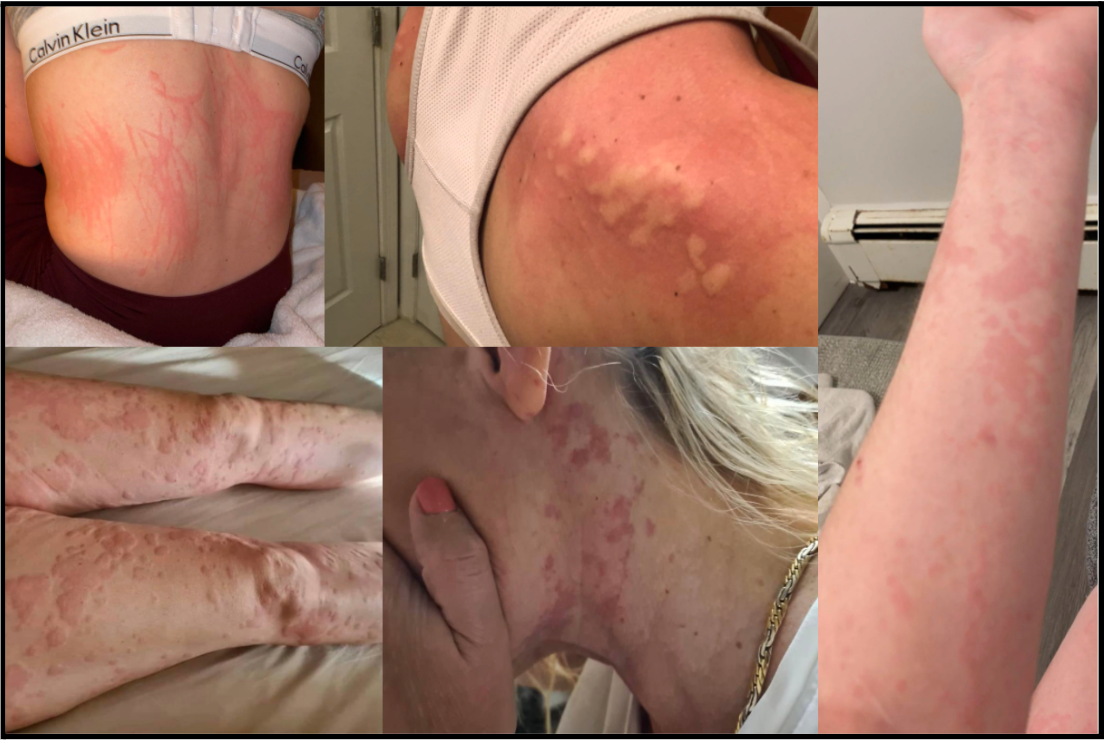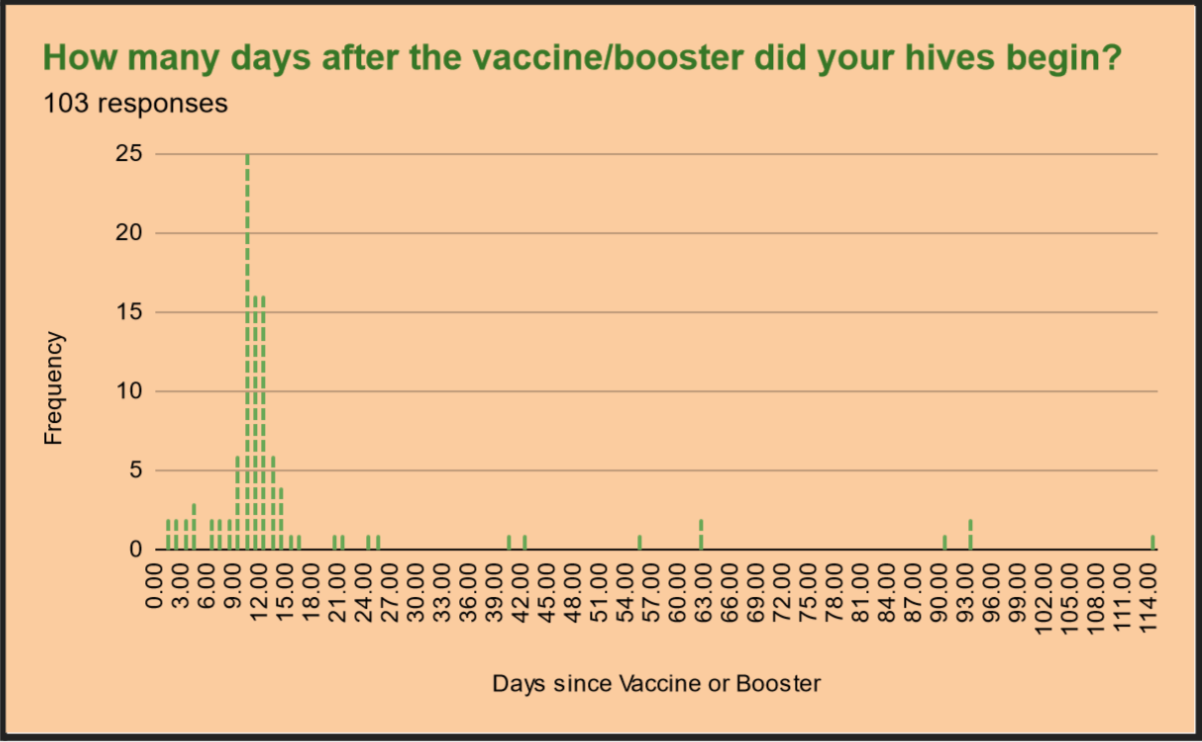A mysterious reaction to the COVID-19 vaccine has many Americans worried about additional doses.
The under-researched and under-publicized phenomenon of urticaria following some COVID-19 vaccine doses is causing confusion and worry among individuals and their doctors.
By Casey Bacot for COMM-320 at American University
With an increase in discussion surrounding additional dosing of the COVID-19 vaccine comes an increase in distress amongst individuals who faced adverse reactions from the shot. One reaction, in particular, has caused panic in thousands of individuals: chronic urticaria.
Pictures of several individuals suffering from urticaria and dermatographia.
Urticaria, also known as common hives, are “red, itchy welts that result from a skin reaction.” It is not listed with other COVID-19 adverse reactions such as fever, nausea, fatigue, and shot-site discomfort.
According to a survey of 103 people conducted by this reporter, urticaria reactions after the COVID-19 vaccine typically begin about 10 days after a dose. It is almost three times more common after the Moderna manufactured vaccine and in middle-aged women.
Data recorded from a survey after being asked the question “Select all COVID-19 vaccines that you have received.”
63-year-old Mary Cuddy is no stranger to these reactions. She has been affected by them since September, roughly seven months ago. While she showed initial signs after her second dose of the Moderna COVID-19 vaccination, she hadn’t connected the vaccine to the flare-up until after she received the booster in October. Cuddy sought medical care when the pain got out of hand.
“It was horrendous,” she said in an interview. Doctors did extensive bloodwork and told her that the reaction was not from the vaccine. She was prescribed steroid cream to numb the pain but after going through several tubes of it within days, she made the decision to stop due to the possible future damage to her skin from overuse of the ointment.
For several individuals, including Cuddy, the mental strain hurts almost as bad as the physical pain.
33-year-old dancer and dance studio owner, Alicia Wilder, who also suffered from hives after her Moderna booster, found comfort in continuing her passion for dance. She said that while she cannot control her continuing flare-ups, she is happy that she can keep her body healthy in other ways.
Wilder has faced problems with insecurities from this reaction. Because of the random nature of her hive flare-ups, she has taken a backseat role in her studio to focus more on choreography and event planning.
“It is hard to perform knowing there’s a rash on my entire body that everyone can see,” Wilder said. Her doctor told her that she should stay away from tight clothing and sweating to reduce her urticaria. This obviously proved to be an issue for her occupation.
With a lack of help and answers from medical specialists and the CDC, some have felt as if they are alone. Many have found comfort in support groups across social media, such as a Facebook group with over six thousand members.
“It made me feel like I wasn’t crazy,” Wilder said about the group that she joined in January, which only had three thousand members at the time.
Positive comments from those experiencing urticaria around the world began flooding in as more and more individuals realized they were not alone.
This group has inspired people to begin alternative methods to reduce their urticaria. Cuddy began experimenting with several treatment options such as a low-histamine diet, UV light treatment, acupuncture, hot yoga, chiropractic sessions, and daily allergy medication. Although she has seen positive results from her treatments, she understands that these may now be a permanent part of her life.
In response to a survey of 103 members of the page, 90 individuals sought medical treatment. None of the respondents said their doctors could give a definite answer as to where their hives came from.
“The reality is that good science takes a lot of time and this is a new reaction,” said an individual suffering from urticaria and joint pain from the vaccine, who wished to be unnamed due to fear of being added to any anti-vax sentiment. As an assistant biology professor studying infectious diseases, she confirmed that while she knows of medical professionals currently researching this reaction, there may not be substantial answers for years.
She first went to her dermatologist because she thought it was acne. As she did not see the reaction until five months after the vaccine and she was relatively young, her doctor concluded that the reaction was shingles related to stress.
“It has become harder for my [general practitioner] to deny that it is the vaccine,” the source said as she continues her search for solutions. She hoped to visit an immunologist regarding her skin reaction but said that due to an influx of patients, there are no open appointments for five months in her area.
Because of her background in infectious diseases, the anonymous patient has begun research regarding the reaction on her own. She speculates that those suffering from this reaction may have a sort of “super-immunity” to COVID-19 due to a constant feedback loop of t-cells which creates large amounts of antibodies.
Self-Reporting Systems
According to the CDC, “Healthcare providers who administer COVID-19 vaccines are required by law to report serious [adverse reactions] regardless of whether the reporter thinks the vaccine caused the [adverse reaction].” This can create a problem for healthcare providers who do not want to create hysteria around the vaccine.
An option for individuals experiencing adverse reactions, such as urticaria, can report their symptoms to the CDC’s Vaccine Adverse Event Reporting System. VAERS is a system created in 1990 to track adverse reactions to all US-licensed vaccines.
VAERS has several pros and cons. While it is a resource that tracks adverse reactions and eventually leads to scientific research, it is a passive reporting system that requires input from a healthcare provider or the patient themselves.
The CDC has also implemented a virtual health check survey called v-safe. This tool was intended for easy reporting directly from patients but unfortunately was not widely publicized. As of September 2021, only 9.2 million people participate in v-safe, roughly 5% of the 563 million people have received at least one dose of a COVID-19 vaccine. Urticaria makes up 3% of all adverse reactions reported.
*vaccines that caused no reactions were not listed*
According to the VAERS WONDER System, almost 25,000 cases of urticaria linked to the COVID-19 vaccine have been reported.
A team at Massachusetts General Hospital currently researching this reaction has created a COVID-19 Vaccine Allergy Patient Case Registry to better hear the voices of patients around the country.
Additional Doses
Anxiety surrounding the need for a fourth vaccine is growing among those who have had adverse reactions. Cuddy, Wilder, and the source that wished to remain anonymous said they are not anti-vax but are unsure about whether they would get additional doses.
“I definitely will not get another until they make one that is specific against the new variant,” said the anonymous source. Currently, all doses of the COVID-19 vaccines are chemically identical, meaning that once an individual has reached a certain level of immunity, receiving more doses may hurt the body more than help it.
The Future
Dr. Kimberly Blumenthal, an Allergist, Immunologist, and drug allergy researcher at Massachusetts General Hospital, has begun conducting research on this reaction.
As an allergist herself, she discovered this issue through her patients.
“It’s probably because epidemiology is hard. We don't have any clear studies showing an increased risk of this after a vaccine. They're also not seeing it a lot. And don't feel comfortable, ascribing causality to it,” she answered when asked why many doctors refuse to attribute cases of urticaria to the vaccine.
She and her team have made several discoveries about the reaction, many of which have already been suspected by those suffering from the condition.
“I think it's just a robust immune response, not an allergy, not autoimmunity, not something to raise concern about necessarily, and it doesn't mean you can't get future vaccinations,” she said.
Blumenthal revealed that most research grants are currently only being awarded for life-threatening reactions to the vaccine.
“Other people are studying heart damage or blood clots or, you know, really deadly things,” she said. “This is a huge quality of life issue that happens largely in healthier individuals, and we're not going to be prioritized.”
The research that her team is conducting will require millions of dollars over several years. She suggested that those suffering from this problem must continue to spread awareness and fundraise for her to achieve the goals thousands of people are hoping for.
She assured that although there is little research published right now, she and her team are sounding alarms on this issue.
“I think my biggest piece of advice is to talk to your doctor about what dosing is useful for you and to not worry so much. Those medicines have been around for ages and it's not permanent. You're not gonna be like this forever. It does burnout.”







